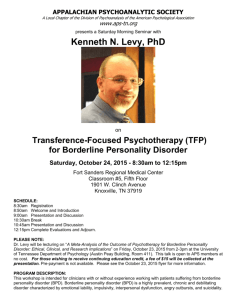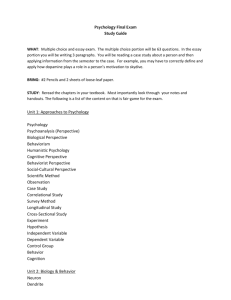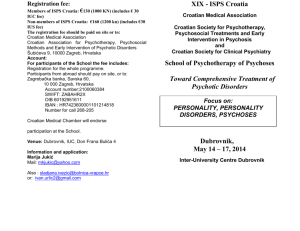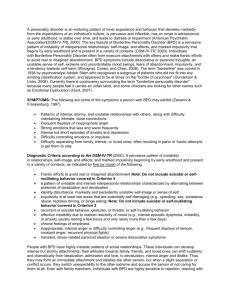more information. - Appalachian Psychoanalytic Society
advertisement
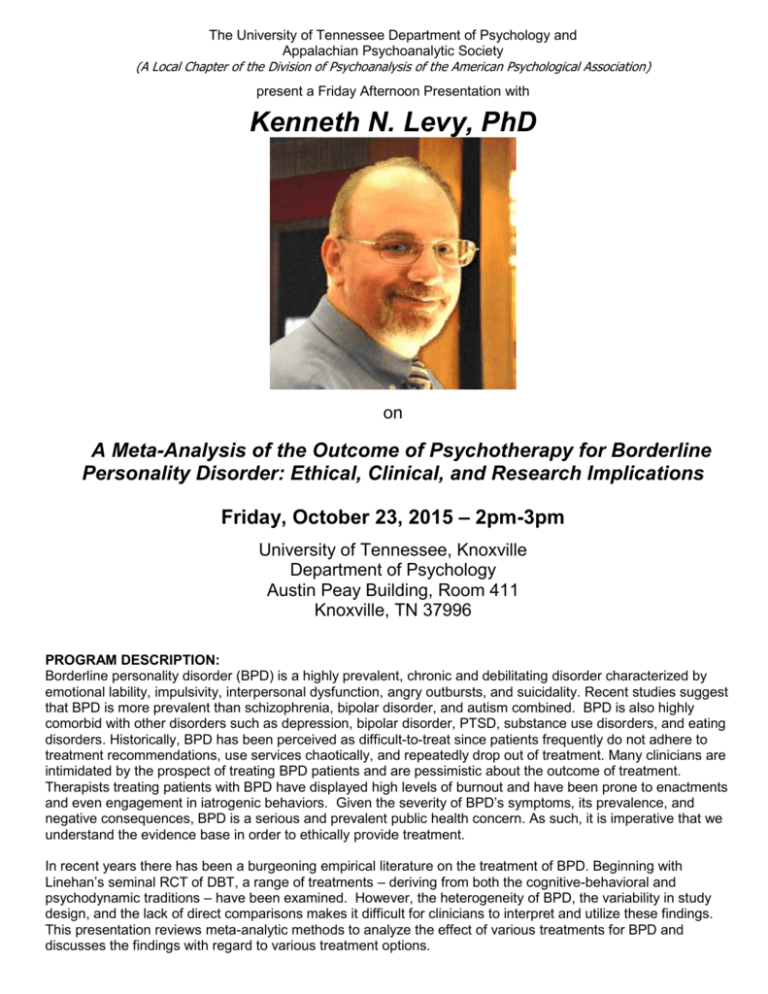
The University of Tennessee Department of Psychology and Appalachian Psychoanalytic Society (A Local Chapter of the Division of Psychoanalysis of the American Psychological Association) present a Friday Afternoon Presentation with Kenneth N. Levy, PhD on A Meta-Analysis of the Outcome of Psychotherapy for Borderline Personality Disorder: Ethical, Clinical, and Research Implications Friday, October 23, 2015 – 2pm-3pm University of Tennessee, Knoxville Department of Psychology Austin Peay Building, Room 411 Knoxville, TN 37996 PROGRAM DESCRIPTION: Borderline personality disorder (BPD) is a highly prevalent, chronic and debilitating disorder characterized by emotional lability, impulsivity, interpersonal dysfunction, angry outbursts, and suicidality. Recent studies suggest that BPD is more prevalent than schizophrenia, bipolar disorder, and autism combined. BPD is also highly comorbid with other disorders such as depression, bipolar disorder, PTSD, substance use disorders, and eating disorders. Historically, BPD has been perceived as difficult-to-treat since patients frequently do not adhere to treatment recommendations, use services chaotically, and repeatedly drop out of treatment. Many clinicians are intimidated by the prospect of treating BPD patients and are pessimistic about the outcome of treatment. Therapists treating patients with BPD have displayed high levels of burnout and have been prone to enactments and even engagement in iatrogenic behaviors. Given the severity of BPD’s symptoms, its prevalence, and negative consequences, BPD is a serious and prevalent public health concern. As such, it is imperative that we understand the evidence base in order to ethically provide treatment. In recent years there has been a burgeoning empirical literature on the treatment of BPD. Beginning with Linehan’s seminal RCT of DBT, a range of treatments – deriving from both the cognitive-behavioral and psychodynamic traditions – have been examined. However, the heterogeneity of BPD, the variability in study design, and the lack of direct comparisons makes it difficult for clinicians to interpret and utilize these findings. This presentation reviews meta-analytic methods to analyze the effect of various treatments for BPD and discusses the findings with regard to various treatment options. EDUCATIONAL OBJECTIVE: After attending this introductory-level seminar in full, participants will be able to: 1) Describe the most current research and various empirically supported treatment options for borderline personality disorder. PRESENTER: Dr. Kenneth N. Levy is an Associate Professor in the Department of Psychology at the Pennsylvania State University, where he directs the Laboratory for the Study of Personality, Psychopathology, and Psychotherapy. At Penn State, he teaches graduate seminars in psychotherapy research, personality theory, psychological assessment, and he supervises a clinical training practicum emphasizing contemporary psychotherapy for personality disorders. Dr. Levy lectures and teaches internationally on Transference Focused Psychotherapy. Dr. Levy also has a faculty appointment in the Department of Psychiatry at the Joan and Sanford I. Weill Medical College of Cornell University where he taught prior to taking a faculty position at Penn State. At Cornell he is the Associate Director of Research at the Personality Disorders Institute (PDI) under the direction of Drs. Otto Kernberg and John Clarkin. Dr. Levy has authored more than 150 articles and chapters and has published in a number of top tier journals such as the Journal of Personality and Social Psychology, American Journal of Psychiatry, Development and Psychopathology, the Journal of Consulting and Clinical Psychology, PNAS, Neuroimage, and Psychological Science. Dr. Levy’s work has led to his selection as an Early Career Fellow of the American Psychoanalytic Association, a Young Investigator Award from the National Alliance for Research in Schizophrenia and Depression, and early career awards from the Society for Psychotherapy Research and the American Psychological Association Division of Psychotherapy. He was the inaugural winner of the North American Society for the Study of Personality Disorders Mid-Career Award. Dr. Levy’s work has been funded by grants from the National Institute of Mental Health, American Psychoanalytic Association, the International Psychoanalytic Association, and the National Alliance for Research in Schizophrenia and Depression. Dr. Levy is the Associate Editor of the Journal of Psychotherapy Integration and serves or has served on the editorial boards of the Journal of Personality Disorders, Personality Disorders: Theory, Research, and Treatment, Psychotherapy Research, Psychotherapy, and the Journal of Consulting and Clinical Psychology, among others. In addition to his teaching and research, Dr. Levy maintains a private practice in State College, PA where he works with individuals with personality disorders in psychodynamically-oriented psychotherapy. PARTICIPANTS: This program is open to graduate students and faculty members (clinical psychology, counseling psychology, social work, education) at the University of Tennessee as well as APS members and other interested mental health professionals who may not be members. It is not limited to individuals practicing in a predominantly psychoanalytic mode. The material will be appropriate for clinicians with a range of experience, from introductory to advanced levels of practice and knowledge. COST: There is no cost to attend the program. For those wishing to receive continuing education credit (see below), a fee of $15 will be collected at the presentation. Pre-payment is not available. CONTINUING EDUCATION: This program, when attended in its entirety, is available for 1.0 continuing education credit. Psychologists will have their participation registered through the University of Tennessee Department of Psychology. For complete information about continuing education credit, please contact Mary Ellen Hunsberger, Psychology Department, 416 Austin Peay Bldg., Knoxville, TN 37996, 865-974-2165. APS, Division 39, and the Department of Psychology are committed to conducting all activities in conformity with the American Psychological Association’s Ethical Principles for Psychologists. APS, Division 39, and the Department of Psychology are also committed to accessibility and non-discrimination in continuing education activities. Participants are asked to be aware of the need for privacy and confidentiality throughout the program. If program content becomes stressful, participants are encouraged to process these feelings during discussion periods. Facility is accessible to persons who are physically challenged. If participants have special needs, we will attempt to accommodate them. Please contact Mary Ellen Hunsberger at the University of Tennessee at 865-974-2165. Questions? Contact either of the APS Co-Presidents: Beverly Gibbons, PhD at 865-694-7859 or Diane Humphreys-Barlow, LCSW at 865-546-0447, ext. 2.

